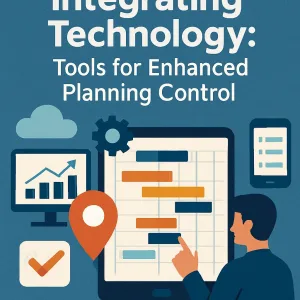Introduction
A project management portfolio is a crucial tool that encompasses a collection of projects and programs managed in a coordinated manner to achieve strategic objectives. This portfolio not only includes ongoing projects but also those that are planned or completed, providing a comprehensive view of an organization’s project landscape. By effectively managing this portfolio, organizations can optimize resource allocation, enhance decision-making, and align projects with broader business goals.
The significance of tailoring project management portfolios for specific industries cannot be overstated. Each sector—be it healthcare, technology, construction, or entertainment—has unique challenges, regulatory requirements, and stakeholder expectations. Customizing portfolios to reflect these industry-specific nuances allows project managers to address the distinct needs of their projects, ensuring that they are not only relevant but also effective in delivering value. For instance, a project portfolio in the healthcare sector may prioritize compliance and patient safety, while one in the technology sector might focus on innovation and speed to market.
In this blog, we will explore various strategies for customizing project management portfolios across different industries. We will delve into case studies that illustrate successful portfolio management practices, discuss tools and techniques that can enhance visibility and efficiency, and provide insights into how project managers can adapt their approaches to meet the demands of their specific sectors. By understanding the importance of tailored project management portfolios, project managers can better navigate the complexities of their industries and drive successful project outcomes.
Understanding Different Industries
The approach and strategies employed can vary significantly across different sectors. Each industry presents its own unique challenges and requirements, necessitating tailored project management portfolios. Below is an overview of various industries, their specific project management needs, and how methodologies may differ.
Industries and Their Unique Challenges
- Information Technology (IT)
- Challenges: Rapid technological changes, cybersecurity threats, and the need for continuous innovation.
- Project Requirements: Agile methodologies are often favored to accommodate changing requirements and iterative development processes. Projects may involve software development, system integration, and IT infrastructure upgrades.
- Construction
- Challenges: Regulatory compliance, safety standards, and project delays due to weather or supply chain issues.
- Project Requirements: Traditional project management methodologies like Waterfall are commonly used, focusing on detailed planning and execution phases. Projects often require extensive documentation and adherence to timelines and budgets.
- Healthcare
- Challenges: Regulatory compliance, patient safety, and the integration of new technologies.
- Project Requirements: Projects may involve implementing new healthcare systems, managing clinical trials, or improving patient care processes. Methodologies like Lean and Six Sigma are often employed to enhance efficiency and reduce waste.
- Finance
- Challenges: Regulatory changes, market volatility, and the need for data security.
- Project Requirements: Projects often focus on compliance, risk management, and financial reporting. Agile and Scrum methodologies can be beneficial for adapting to changing regulations and market conditions.
- Marketing
- Challenges: Rapidly changing consumer preferences, digital transformation, and competition.
- Project Requirements: Projects may include campaign management, brand development, and market research. Agile methodologies are frequently used to allow for quick pivots based on market feedback and analytics.
Methodological Differences Across Industries
- Agile Methodology: Predominantly used in IT and marketing, Agile allows for flexibility and responsiveness to change, making it ideal for projects with evolving requirements.
- Waterfall Methodology: Common in construction, this linear approach emphasizes thorough planning and execution, suitable for projects with well-defined stages and deliverables.
- Lean and Six Sigma: Frequently applied in healthcare and manufacturing, these methodologies focus on efficiency and quality improvement, aiming to minimize waste and enhance processes.
- Hybrid Approaches: Many industries are now adopting hybrid methodologies that combine elements of Agile and traditional approaches to better suit their specific project needs.
By understanding the unique challenges and requirements of each industry, project managers can tailor their portfolios to effectively address the specific demands of their sector. This customization not only enhances project outcomes but also aligns with the strategic goals of the organization, ultimately leading to greater success in project delivery.
Customization Strategies for Your Portfolio
When it comes to project management, a well-tailored portfolio can significantly enhance a project manager’s credibility and effectiveness across various industries. Here are some actionable strategies for customizing your project management portfolio to align with industry-specific needs:
Key Elements of an Effective Project Management Portfolio
- Project Overview: Clearly outline the scope, objectives, and deliverables of each project. This should include a brief description of the project’s purpose and its relevance to the industry.
- Methodologies Used: Highlight the project management methodologies employed, such as Agile, Waterfall, or Lean. This demonstrates your adaptability and understanding of industry standards [6].
- Outcomes and Metrics: Include quantifiable results and key performance indicators (KPIs) that showcase the success of your projects. This could involve metrics like budget adherence, timeline efficiency, and stakeholder satisfaction [8].
- Visual Dashboards: Utilize customized dashboards to present project data visually. This can help stakeholders quickly grasp project status and performance [1].
Importance of Aligning Portfolio Content with Industry Standards
Aligning your portfolio with industry standards is crucial for several reasons:
- Credibility: Demonstrating familiarity with industry-specific practices and standards enhances your credibility among peers and potential employers [4].
- Relevance: Tailoring your portfolio ensures that the content resonates with the specific challenges and expectations of the industry, making it more relevant to your audience [3].
- Competitive Edge: A customized portfolio can set you apart from other project managers by showcasing your specialized knowledge and experience in a particular sector [5].
Examples of Customizing Project Descriptions, Methodologies, and Outcomes
Construction Industry:
- Project Descriptions: Focus on large-scale projects, such as infrastructure development or commercial buildings. Highlight your role in managing timelines, budgets, and compliance with safety regulations.
- Methodologies: Emphasize the use of Lean construction principles to minimize waste and improve efficiency.
- Outcomes: Showcase successful project completions within budget and ahead of schedule, along with client testimonials [9].
IT Sector:
- Project Descriptions: Detail software development projects, including app launches or system upgrades. Discuss your involvement in stakeholder engagement and user testing.
- Methodologies: Highlight Agile methodologies, particularly Scrum, to illustrate your ability to adapt to changing requirements.
- Outcomes: Present metrics such as user adoption rates and system performance improvements post-implementation [10].
Healthcare:
- Project Descriptions: Describe projects related to healthcare IT implementations or facility upgrades. Focus on compliance with healthcare regulations and patient safety.
- Methodologies: Discuss the use of Six Sigma for process improvement and quality assurance.
- Outcomes: Include data on improved patient outcomes or operational efficiencies achieved through your projects [7].
By implementing these strategies, project managers can create a compelling portfolio that not only showcases their skills and experiences but also aligns with the specific needs and expectations of their target industry. This tailored approach not only enhances professional credibility but also increases the likelihood of securing future opportunities in a competitive job market.
Portfolio Examples by Industry
Tailoring portfolios to meet the specific needs of different industries is crucial for enhancing project success and stakeholder engagement. Below are examples from various sectors, showcasing how customization strategies can lead to more effective project management portfolios.
1. IT Project Management Portfolio
Case Study: A leading software development company implemented a project management portfolio that focused on Agile methodologies. This approach allowed for rapid iterations and flexibility in responding to client feedback.
Tailored Elements:
- Agile Framework: The portfolio utilized Scrum and Kanban boards to manage tasks, which are essential for IT projects that require constant updates and adjustments.
- Risk Management Tools: Specific tools were integrated to address cybersecurity risks, which are prevalent in IT projects.
- Impact: This customization led to a 30% increase in project delivery speed and significantly improved client satisfaction due to enhanced responsiveness to changes [6].
2. Construction Project Management Portfolio
- Case Study: A construction firm developed a project management portfolio that emphasized compliance and safety regulations, which are critical in the construction industry.
Tailored Elements:
- Compliance Tracking: The portfolio included features for tracking compliance with local building codes and safety standards, ensuring that all projects adhered to legal requirements.
- Resource Allocation: Custom tools for managing labor and materials were implemented to optimize resource use and reduce waste.
- Impact: By focusing on these tailored elements, the firm reduced project delays by 25% and improved stakeholder trust through transparent reporting on compliance and safety measures [6][8].
3. Healthcare Project Management Portfolio
Case Study: A healthcare organization created a project management portfolio that prioritized patient care and regulatory compliance.
Tailored Elements:
- Patient-Centric Metrics: The portfolio included specific metrics for measuring patient outcomes and satisfaction, which are vital in healthcare projects.
- Interdisciplinary Collaboration Tools: Tools were designed to facilitate communication among various healthcare professionals, ensuring that all stakeholders were aligned on project goals.
- Impact: This customization resulted in a 40% improvement in project outcomes related to patient care and a notable increase in stakeholder engagement, as healthcare professionals felt more involved in the project processes [5][7].
4. Marketing Project Management Portfolio
Case Study: A marketing agency tailored its project management portfolio to focus on campaign performance and client feedback loops.
Tailored Elements:
- Performance Analytics: The portfolio integrated analytics tools to track campaign performance in real-time, allowing for quick adjustments based on data insights.
- Client Collaboration Platforms: Custom platforms were developed to enhance communication with clients, enabling them to provide feedback throughout the project lifecycle.
- Impact: This approach led to a 50% increase in campaign effectiveness and improved client retention rates, as clients appreciated the transparency and responsiveness of the agency [4][9].
Tools and Resources for Building Your Portfolio
Creating a tailored project management portfolio is essential for project managers looking to showcase their skills and experiences effectively across various industries. Here are some recommended tools and resources that can aid in the development of a customized project management portfolio:
Software and Tools for Portfolio Creation
- Microsoft Project: A comprehensive project management software that allows users to plan, execute, and track projects efficiently. It offers features like Gantt charts and resource management, making it suitable for complex project portfolios [3].
- Trello: This user-friendly tool utilizes a kanban board system, allowing project managers to visualize tasks and progress. Trello is particularly useful for teams that prefer a more flexible and collaborative approach to project management [4].
- Asana: Known for its task management capabilities, Asana helps teams organize their work and track project progress. It offers customizable templates that can be tailored to fit specific industry needs [4].
- ProjectManager: This platform provides powerful tools for managing project portfolios, including customizable dashboards that allow project managers to track multiple projects simultaneously and make informed decisions [7].
- Sciforma: A robust Project and Portfolio Management (PPM) software designed to help organizations prioritize, plan, and execute projects efficiently. It is particularly beneficial for those managing large portfolios across various sectors [3].
Online Resources, Templates, and Courses
- Online Courses: Platforms like Coursera and Udemy offer a variety of project management courses that can enhance your skills and knowledge. These courses often include practical examples and case studies relevant to different industries.
- Templates: Websites such as Smartsheet and Template.net provide a range of project management templates, including project briefs, Gantt charts, and status reports. These templates can be customized to fit specific project needs and industry standards [1].
- Wikis and SOPs: Creating searchable and editable project briefs and standard operating procedures (SOPs) can be a game-changer in project success. Utilizing tools that allow for easy sharing and collaboration can enhance the effectiveness of these documents [1].
Importance of Continuous Learning and Staying Updated
In the ever-evolving field of project management, continuous learning is crucial. Staying updated with industry trends and best practices not only enhances your portfolio but also ensures that you remain competitive in the job market. Engaging in professional development through workshops, webinars, and industry conferences can provide valuable insights and networking opportunities. Additionally, subscribing to project management journals and following thought leaders in the field can help you stay informed about the latest tools and methodologies [6].
By leveraging these tools and resources, project managers can create a customized portfolio that effectively showcases their skills and experiences, tailored to the specific demands of their industry.
Common Mistakes to Avoid
When creating a project management portfolio tailored for specific industries, it is crucial to avoid common pitfalls that can undermine its effectiveness. Here are some typical mistakes to watch out for:
- Being Too Generic: One of the most significant errors is failing to customize the portfolio to reflect the unique characteristics of the industry. A generic portfolio may not resonate with potential employers or clients, as it lacks the specific context and relevance that demonstrate your understanding of industry nuances [4][5].
- Neglecting Industry Jargon: Each industry has its own terminology and standards. Using generic language instead of industry-specific jargon can make your portfolio appear out of touch. It is essential to incorporate relevant terms and concepts that showcase your familiarity with the field [4][5].
- Ignoring Stakeholder Perspectives: Not identifying all stakeholders or understanding their needs can lead to a portfolio that does not address the expectations of key decision-makers. Engaging with stakeholders during the portfolio creation process can provide valuable insights that enhance its relevance [5][6].
- Lack of Clear Objectives: A portfolio without clear objectives can confuse its audience. It is vital to define what you aim to achieve with your portfolio and ensure that it aligns with the goals of the industry you are targeting [4][5].
- Failure to Manage Risks: Just as in project management, neglecting to consider potential risks in your portfolio can lead to oversights. This includes not addressing possible gaps in your experience or skills that may be relevant to the industry [6][7].
Importance of Feedback from Industry Peers
Feedback from industry peers is invaluable when customizing your project management portfolio. Engaging with colleagues or mentors can provide insights into what works and what doesn’t within your specific sector. They can help identify areas for improvement, suggest relevant projects to highlight, and ensure that your portfolio aligns with current industry trends and expectations. This collaborative approach not only enhances the quality of your portfolio but also fosters professional relationships that can be beneficial in the long run [6][7].
Need for Regular Updates and Revisions
The landscape of project management is constantly evolving, and so should your portfolio. Regular updates and revisions are essential to keep your portfolio relevant and reflective of your latest experiences and achievements. This includes adding new projects, removing outdated information, and adjusting the content to align with changing industry standards. By maintaining an up-to-date portfolio, you demonstrate your commitment to continuous improvement and adaptability, which are critical traits in project management [1][2][3].
In summary, avoiding common mistakes in portfolio customization, seeking feedback from peers, and committing to regular updates are key strategies for creating an effective project management portfolio tailored to specific industries.
Conclusion
the significance of customizing project management portfolios to align with the unique demands of different industries cannot be overstated. Tailoring these portfolios ensures that project managers can effectively address the specific challenges and opportunities that arise within their respective sectors. By understanding the nuances of their industry, project managers can enhance visibility, drive efficiency, and strategically align their projects with overarching business objectives [9].
As you reflect on your own project management portfolio, consider taking the time to assess and refine it. Evaluate whether your current projects and methodologies are suited to the specific needs of your industry. This process not only helps in optimizing resource allocation but also in maximizing the impact of your projects [3][8].
Find out more about Shaun Stoltz https://www.shaunstoltz.com/about/.
This post was written by an AI and reviewed/edited by a human.



